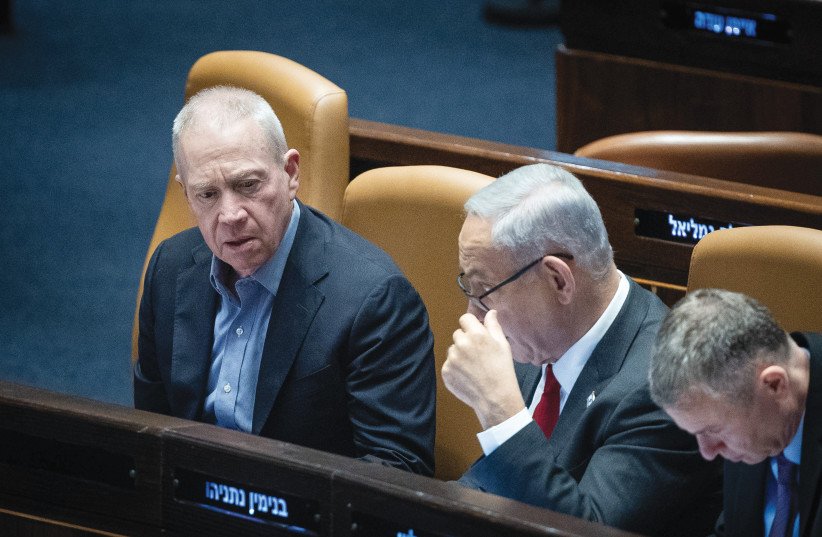Hearings for the petitions against the judicial reform reasonableness standard law and on the Judicial Selection Committee assembly will be set in September after the court recess, the High Court of Justice ruled on Wednesday.
Despite the request by petitioners to issue an interim injunction against the reasonableness standard law, the court determined that there was no place for such an order at this time.
The legislation was added to the law book and came into effect on Wednesday.
Respondents for the reasonableness bill, which include the government, Knesset, Justice Minister Yariv Levin, and the Constitution, Law and Justice Committee, have ten days to respond once the final date is set. Levin also has 10 days to respond to the Judicial Selection Committee petitions once the date is set.
A barrage of petitions was filed against the bill
A barrage of petitions was filed against the reasonableness bill on Monday and Tuesday, after it had passed in a dramatic Knesset voting session on Monday.

The new law – an amendment to Basic Law: The Judiciary – would restrict the use of judicial review against government, ministerial, and prime ministerial administrative decisions by deeming them far beyond what a reasonable and responsible authority would undertake.
The petitions argued that the law threatened to upend rule of law and the separation of powers, and was part of an agenda to tear down Israel’s democratic regime. Without a reasonableness standard the courts had lost a rare check against the excess of the other branches, and officials could act arbitrarily and capriciously in their implementation of policy. Gone was a requirement to act reasonably and to show one’s reasoning for administrative decisions, opening the door to corruption and the dismissal and appointment of civil servants without accountability.
The Knesset, petitioners argued, had abused its constitutional authority with a bill that went against the fabric of constitutional norms. Basic Laws are supposed to establish powers, responsibilities, and state structures as part of the constitutional process, but petitioners said the law was created to extract immediate political benefit.
It was also argued that the law was procedurally faulty, given that it was advanced as a committee bill when it allegedly should have been a private one. Committee laws are usually for technical matters, and do not need to go through a preliminary reading and a following 45-day waiting period.
The High Court has never struck down Basic Law legislation before, instead opting in the past to interpret or work to defer to other measures like reasonableness. It is debated whether the court can actually engage in judicial review of basic laws, and there is a risk of constitutional crisis if they do so.
Eliad Shraga, head of the Movement for Quality Government (MQG) in Israel, one of the petitioning groups, said that they were ready to make their case in court to strike down the reasonableness bill.
“We will appear in the Supreme Court to defend Israeli democracy, and we will do everything we can to stop the coup!” Shraga exclaimed in response to the decision. “We will continue to demonstrate and fight everywhere and on every platform until the threat is removed!”
Another matter relating to judicial reform is the controversy of the Judicial Selection Committee. Levin has said that he will not convene the committee to begin selecting judges until it has been reformed.
Petitions were filed by Yesh Atid and MQG on Tuesday against Levin’s decision, arguing that the justice minister was abusing his power for political benefit – and the result was damage to the legal system – and that this severely wrongs the citizens who rely on that system.
“Every additional day that the committee does not meet to elect additional judges, the burden on the courts increases and harms the citizens of the country,” said MQG attorney Hidi Negev. “It seems that the minister of justice is abusing his authority for his personal political considerations.”
Another High Court legal matter that also advanced on Tuesday was the status of the incapacitation law, which amended Basic Law: The Government, to clarify that a prime minister can only be declared unfit to serve over health issues. On Tuesday, the Attorney-General’s Office for the first time sanctioned the striking down of a Basic Law amendment, arguing that Prime Minister Benjamin Netanyahu and his supporters had advanced the law to improve his personal legal situation against violating his conflict of interest agreement for his ongoing corruption trials.
Former justice minister Ayelet Shaked responded to the controversy on X, formerly known as Twitter, saying that the High Court had no reason to interfere with the law.
“It is absurd to claim that the court should intervene without any legal basis,” said Shaked. “Beyond the fact that there is no harm or contradiction, the Supreme Court lacks any authority to interfere with basic laws. In the past, even for the Attorney-General’s Office, this was self-evident.”
After a brief respite, the anti-judicial protests will resume Thursday night after Tisha Be’av, with a March in Tel Aviv, winding up at Kaplan Street. According to N12, police are considering using tear gas to disperse protesters who block roads. This is after criticism of excessive violence toward protesters earlier this week, some documented in video footage taken Monday night after the Knesset vote.
